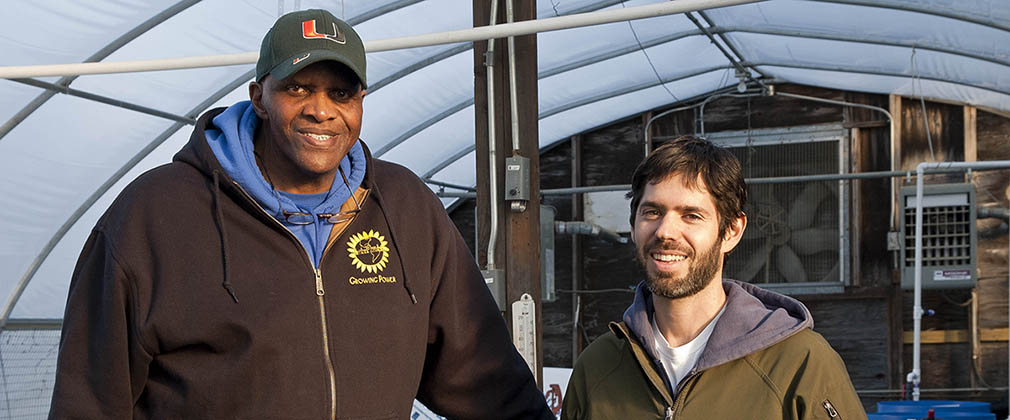The Will Allen Index: Growing Power to the People
Today, for a change, I will gush.
Why the gushing? Because I’ve been hanging around Will Allen, an urban farming pioneer with nearly cult-hero status among foodies and farmers. He’s an inspiration, an overflowing font of information, and the picture of humility.
The son of a sharecropper, Mr. Allen swore as a young man that he’d never return to farming—now he’s the CEO of a Milwaukee-based community food center that’s doing so many bold things with food systems that it’s hard to keep track of all his good works. (He’s also a former professional basketball player, a MacArthur fellow, and a spokesperson for First Lady Michelle Obama’s Let’s Move! campaign.)
Growing Power, which he founded 18 years ago, is a soup-to-nuts food operation that starts with soil; they make their own, from food waste collected from breweries (this is Milwaukee, after all), Walmart, and other sources. With the soil they make, they build urban gardens and grow food; the builders themselves are a diverse lot hired from the communities where the gardens are sited. The food gets sold to fancy restaurants for good prices, but it also sells affordably at 15 different farm stands in food deserts and food swamps. Incredibly, Growing Power uses zero chemicals and fossil fuels to grow, and they are constantly researching new and better technologies for sustainable food production.
There’s something else I’d like to brag about on his behalf, because he doesn’t. Growing Power provides what he calls a “living wage” for its 100+ employees. In farm work, a living wage is nothing to sneeze at. According to the NASS Farm Labor Survey, the average wage for farm work is $10.22 per hour. And advocacy groups estimate that migrant farmworkers make $6-7 per hour, at best. But Growing Power pays its trained employees $15 per hour, and it hires people with a history of incarceration, investing in their careers. “It’s expensive,” he says, referring to the social workers, psychiatrists, drug tests, and medical exams that are part-and-parcel of successfully employing recent releasees from prison. “But we have to give this population a chance,” he says.
Because of a recent knee replacement and hip surgery, Mr. Allen walks slowly. But when he talks, he reels off statistics with agility and speed—and with such a twinkle in his eye—that it’s easy to see how he’s forged partnerships with giants like Walmart, Sysco, and Kohl’s. If we’re going to change the food system, he says, “We need those people at the good food revolution table.” And one thing is clear when he speaks, whether it’s about the price of his watercress ($16 per pound), his favorite vegetable (okra), his favorite employees (earthworms), or the most delicious fish he’s ever tasted (black pacu)—he loves to eat food, he loves to grow food, and he loves to teach people how to do both, well.
Here’s my stab at a Will Allen Index.
Food Production at Growing Power
40: types of greens grown by Growing Power
50: goats being raised for milk and artisanal cheese
100: pounds of honey harvested per honeybee hive
500: chickens being raised for eggs
500,000: dollars worth of crops produced in one year
365: days per year that Growing Power produces food, through Wisconsin winters
Aquaponics at Growing Power
100,000: fish raised in system, including tilapia, perch, blue gill
70: percentage of heated water provided by solar hot water system
6: dollars per whole tilapia sold to restaurants
3: number of years it takes one lake perch to reach maturity in Lake Michigan
1: number of years it takes one lake perch to reach maturity in aquaponics system
Vermicomposting at Growing Power
40,000: pounds of worm castings, used as fertilizer, produced every 4 months
4: number of months for worm population to quadruple
2: dollars per pound of worm castings, wholesale
4: dollars per pound of worm castings, retail
7: species of worms used
200: number of worms that create a transformative moment when held by a child
Waste to Soil at Growing Power
80,000: pounds of food waste provided for compost by Walmart, weekly
80,000: pounds of brewery waste provided by Lakefront Brewery, weekly
150: degrees internal temperature of compost, which kills E. coli
40: wheelbarrow loads of food waste required to make 1 yard of compost
22 million: pounds of food waste converted to compost, yearly
365: days per year that Growing Power collects food waste and composts it
Community
100: employees paid a “living wage”
150: number of employees being hired next year
75: yards of compost used for every vacant lot transformed into a “flower explosion”
3.5: miles between Growing Power and closest grocery store
5: blocks between Growing Power and public housing community
40,000: number of Milwaukee public school students served Growing Power food
Very Cool at Growing Power
5: number of stories of Growing Power’s 2012 vertical farm project in Milwaukee
100: degrees to which an anaerobic digester heats food waste slurry to convert into acetic acid and then into methane, to be sold as electricity
100: percentage water catchment
25: percentage of energy supplied through on-site solar energy systems
0: chemicals used to grow food
0: fossil fuels used to grow food
The Quotable Will Allen
- “There’s good food, and then there’s this other stuff that we eat.”
- “Farming is all about the soil. … If you can grow good soil, you can grow good food.”
- “Our food is our medicine. Some of us take good medicine, and some of us take bad medicine.”
- “A local food system is the only way to guarantee you’re eating food with its full nutrient impact.”
